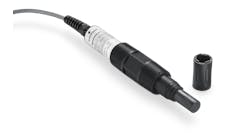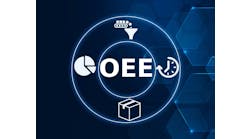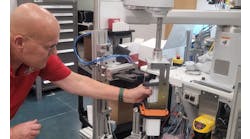In this episode of the Manufacturing Tomorrow's Workforce podcast, Christine LaFave Grace and Nandita Gupta, process controls engineer at Georgia-Pacific and a 2019 Influential Women in Manufacturing honoree discuss Gupta's experience entering the workforce with a mentor, and how she hopes to provide new engineers with a similar or better experience through a formal mentoring program at Georgia Pacific, which is set to launch soon.
Transcript
Amanda Del Buono: Hello there, and welcome back to Manufacturing Tomorrow’s Workforce. I’m Amanda Del Buono. After a short hiatus we’re back with a great discussion between Christine LaFave Grace and Nandita Gupta, process controls engineer at Georgia-Pacific and a 2019 Influential Women in Manufacturing honoree. They’ll discuss the Gupta’s mentoring relationship and how that influenced her to develop a full mentoring program at Georgia-Pacific, which will launch soon.
Here’s their discussion.
Christine LaFave Grace: 26-year-old Nandita Gupta remembers her first couple of days on the plant floor as a process controls engineer at a Georgia-Pacific factory in North Carolina—and in particular, she remembers being mistaken as “the new HR girl” rather than the new controls engineer.
At a time when manufacturers are struggling to recruit young people to the field, having team members make assumptions about new talent in the plant is likely one of the last things that hiring managers want to see. But Nandita, who says that trust has to be earned; it’s not given, was undeterred. In time she earned the trust of her direct colleagues as well as plant operators and has since led her site’s ergonomics team in incorporating principles of human-centered design within controls engineering. And to help her organization confront the challenges of manufacturing workforce recruiting and retention, she pushed to launch an internal mentoring program for young engineers and especially young women within the company.
Nandita, thanks so much for joining me today.
NG: Thank you for having me, Christine.
CLG: Can you tell me a little bit about the genesis of this mentor program? The need that you saw and what you hope to accomplish with it?
NG: So, before I go into that, I’d just like to share a quick story. So, I’m very blessed. I had an absolutely fantastic mentor who was assigned to me at my site. And when I would have times when I couldn’t find my own voice, and he would help me find that voice. As a controls engineer, you have to keep up with training and go to different automation fairs and things like that. So, I was going for one of my Level 3 trainings at one of my vendor sites, and I guess I was used to this by now, where I was the only women engineer in the room. So, I walk in and I’m one of the younger female engineers, and I walk in for this week-long training, and I think somewhere midway through the training I was starting to feel really, really cold. The conference room was exceptionally cold, and other people were also feeling it, but initially I was very shy about wanting to say something, but I finally went up to the instructor and requested from him that ‘hey, would you please turn it down a little bit? Because I’m wearing a sweater and wearing a jacket and I’m shivering out there.’ And he actually called me Goldilocks, and other people kind of snickered. You don’t go through electrical engineering without developing a tough skin, but that was just something that kind of gnawed at me. And I came back to my site, and I shared this story with some of my colleagues and I shared it with my mentor, and I didn’t want to be called touchy, and I didn’t want to be told ‘you’re so sensitive.’ I got that a lot earlier, not at my site every but in school and coming through college I got that a lot. So, I was really apprehensive about bringing that up and I was really surprised when that afternoon that the vendor site lead actually called and apologized to me because of that. And I was very touched because I didn’t make that call, so my mentor actually did on my behalf and told them that this is not OK.
So, that is a story I really love to share when you think about what was my inspiration, because I knew so many colleagues who really felt a lack of mentorship at other sites, and I really wanted everyone to have a better, if not the same, experience as I did with my mentor at site. And our company’s amazing. I would hate to see people like me and people smarter than me leave the company because they felt a lack of mentorship.
CLG: Yeah, and it’s something that’s so easy to form a quick impression and to turn somebody off so quickly, those experiences that can gnaw at you, or just that memory that comes to mind when companies are struggling with retention and recruiting people, that’s the kind of thing that could immediately turn someone away from a position that maybe they were very excited about. So, to really have a concerted effort to make sure that people have those good experiences, that seems like such a powerful endeavor.
Can you tell me a little bit about how you’ve gone about this? The kind of buy-in that you’ve sought and won, and who’s all involved in the program, and how it’s going to look when it’s really up and running.
NG: So, it’s really interesting that you mention buy-in, because I feel my company already has the buy-in to want to do this. I feel I was just at the right place at the right time talking to the right people, because I’ve been trying to advocate for a formal mentoring program, because we do have mentoring within our company. We assign mentors as people come in and that already exists, but there wasn’t something central, there wasn’t something that OK yeah, this is here, these are some of the responsibilities, this is what you’ve got to do. And so, I was talking to the engineering development program manager, and I got his attention and we had certain conversations. It’s like a very natural sort of relationship where you meet someone at a conference and talk to them, and the next time you follow up with them and say ‘hey, what do you think about doing this?’ And the idea just turned into reality, and I am really blessed that I met all these people who had more drive if not as much as I did to truly do this. So, it was a team effort and we got together and are launching this.
CLG: That’s great that’s really cool. So, what is it going to look like as far as when meetings are held, or how you’ll recruit and pair mentors with mentees?
NG: So, we really believe, we have MBM philosophy as part of Georgia Pacific and Koch, and we firmly believe that you have to have the right talent and the right virtue in people. Someone might be a great engineer, but they might not make a good mentor. So, it was important to us to basically have a call-out, calling out for mentors to volunteer and see who’s interested. And then we can kind of go through that and see OK, this person will make a great mentor, and so on and so forth. And the other thing we wanted to really be delicate about was you can’t have a one-size-fits-all. You can’t have one mentor who can give you everything. It’s a network. So, you might have someone who’s a really good technical mentor but might not be as good as a career development mentor. So, we wanted to make sure that even though we solicit mentors, it’s ‘hey, what area do you feel comfortable mentoring in?’ It might be project management, conflict management. New engineers coming in from school might struggle with some of these things because it’s their first real-world work experience. So, they don’t know how to work in teams, they might not really understand OK what’s the best way to do this. So, just trying to understand the different areas and being able to have different people, so that we can provide our engineers with a network rather than just one person.
For more, tune into Manufacturing Tomorrow's Workforce
Latest from Asset Management

Leaders relevant to this article:


